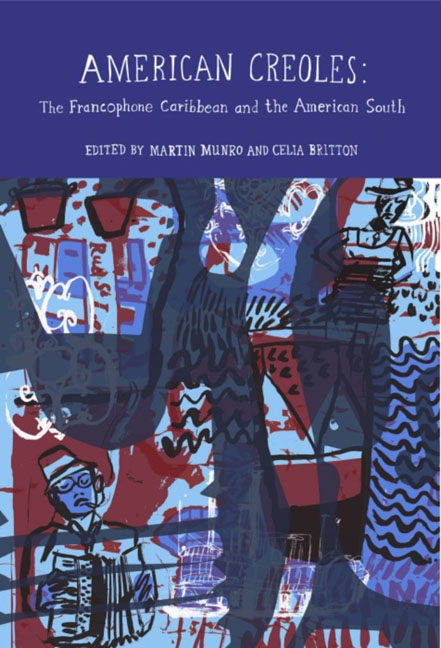Book contents
- Frontmatter
- Contents
- List of Illustrations
- Acknowledgements
- Introduction
- Creolizations
- Music
- ‘Fightin’ the Future': Rhythm and Creolization in the Circum-Caribbean
- Leaving the South: Frantz Fanon, Modern Jazz, and the Rejection of Négritude
- The Sorcerer and the Quimboiseur: Poetic Intention in the Works of Miles Davis and édouard Glissant
- Creolizing Jazz, Jazzing the Tout-monde: Jazz, Gwoka and the Poetics of Relation
- Intertextualities: Faulkner, Glissant, Condé
- Notes on Contributors
- Index
The Sorcerer and the Quimboiseur: Poetic Intention in the Works of Miles Davis and édouard Glissant
from Music
- Frontmatter
- Contents
- List of Illustrations
- Acknowledgements
- Introduction
- Creolizations
- Music
- ‘Fightin’ the Future': Rhythm and Creolization in the Circum-Caribbean
- Leaving the South: Frantz Fanon, Modern Jazz, and the Rejection of Négritude
- The Sorcerer and the Quimboiseur: Poetic Intention in the Works of Miles Davis and édouard Glissant
- Creolizing Jazz, Jazzing the Tout-monde: Jazz, Gwoka and the Poetics of Relation
- Intertextualities: Faulkner, Glissant, Condé
- Notes on Contributors
- Index
Summary
Édouard Glissant's writing is deeply rooted in a strategy that challenges a hegemonic form of language use, as described in detail by Celia Britton, with particular reference to his essays and novels (Britton, 1999). Miles Davis's music, too, can be interpreted as a counter-discourse. The literature of the Caribbean and jazz music in the United States belong in fact to areas of cultural activity which have comparable histories despite their dissimilarities. A comparative approach to Glissant's writing and the trumpet player's improvisations can therefore allow us to reflect on the connections between strategies of resistance and, on the other hand, the emergence in these two artists of independent formal concerns.
We do find references to music from time to time in Glissant's writings on poetics. He quotes Bob Marley in Poétique de la relation (Glissant, 1990: 107) and frequently mentions jazz in particular as an example of ‘pensée de la trace’ [trace thought]. It has to be said, though, that the position of music in his poetics is not as prominent as that of literature and the visual arts. Nevertheless, the limited number of references to music in Glissant's writings is perhaps not an accurate reflection of the true importance of this art to his poetics. The author of Sel noir in fact asserts: ‘Il y a une mesure secrète des formes de la musique et de la philosophie, les deux arts les plus proches à la fois dans leur précision et leur évanescence’ [There is a secret time signature in the structures of music and philosophy, the two arts which are closest to each other in both their precision and their evanescence] (Glissant, 2006: 116). One of the most intense prose pieces in La Cohée du Lamentin, entitled ‘Au plus obscur des musiques’ [Music at its most obscure] (Glissant, 2005: 243), is on the subject of silence and music as they enter into contact with the vastness of the world. And, during a press conference given on 21 July 2007 in the Basque village of Itxassou to introduce his collaboration with the multiinstrumentalist Bernard Lubat, the poet declared: ‘Mon style d'écriture est le style de jazz de Miles Davis’ [My writing style is the jazz style of Miles Davis].
In common usage, when the term ‘style’ is associated with a writer it tends to define individual character.
- Type
- Chapter
- Information
- American CreolesThe Francophone Caribbean and the American South, pp. 147 - 164Publisher: Liverpool University PressPrint publication year: 2012



